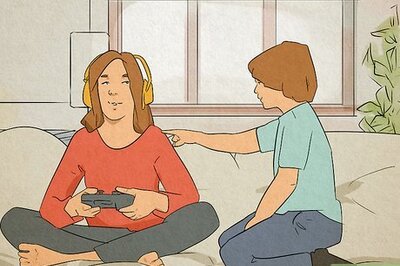
views
Monitor yourself and keep a list of your triggers.

Pay attention to how you react to things in your daily life. If you figure out your triggers, it’ll be easier for you to control your reactions in the future. As you go through your day, pay attention to things that make you want to take control. What are the circumstances and who tends to be involved? Generally, instability, fear, and anxiety are behind controlling behaviors. If your list shows the same people or circumstances repeatedly, think about why.
Challenge the fears behind your behavior.

Controlling behaviors are often caused by fear and anxiety. To get past the controlling behavior, it helps to figure out exactly what you’re afraid of and if that fear is logical. When you feel the urge to control something or someone, ask yourself why and what the cause might be. Try questions like: Am I afraid of what could happen if I can’t control this situation or person? Am I worried a situation will turn out badly unless I’m in control of it? What are the chances of this bad thing actually happening? What evidence do I have to support this thought? Are my emotions clouding my judgment right now?
Replace fearful thoughts with positive ones.
It helps to have a positive mantra to use when you’re struggling. When you find yourself in a challenging situation that you want to control, use your mantra to drown out those negative thoughts with more positive ones. This can help you stay composed and focused on your goal. You can create your own mantras or try options like: I don’t need to control everything. I can tolerate uncertainty in this situation. I can only control myself and that’s okay. I can respect other people’s choices. I know my way isn’t the only way.
Embrace imperfection in yourself and others.

Perfection is an unrealistic ideal. No person or situation is ever going to be perfect! Everyone makes mistakes, forgets things, and makes bad decisions sometimes. Micromanaging won’t change those basic truths. When you find yourself in a controlling frame of mind, remind yourself that imperfection is normal and human. If you have a friend that's always late to everything, that can be pretty frustrating. Try to avoid lecturing them every time, though. If your partner always forgets to pick up groceries, try to resist lecturing them about making to-do lists. If one of your coworkers regularly sends out emails with typos in them, that's okay! You don't need to point it out or remind them to proofread every time it happens.
Resist the urge to give advice.

Giving unsolicited advice is a common controlling behavior. It’s a tough habit to break, but you can do it! Whenever you feel the urge to give someone advice because you don’t think they’re doing something correctly, ask yourself if you're being objective and whether your advice is likely to be appreciated. You could even try living by a “no advice” policy for a while to help you break that habit. Remind yourself that there’s usually more than one way to do something. Even if "your way” is right, there are other good ways to handle the same situation. If your friend is telling you about a situation with her boyfriend, don't give her advice unless she asks for it. Just be there for her and hear her out. If your partner embarks on a new fitness plan, avoid telling them what exercises you think they should be doing, especially if they didn't ask you. Offering unsolicited advice can make them feel judged or inadequate.
Find other ways to manage anxiety.

Managing your anxiety can help put a stop to controlling urges. Read books about anxiety, check out podcasts, and try mindfulness techniques like meditation and breath control. You could also try yoga, running, playing music, or painting! Do something you enjoy that calms you down and takes your mind off of worrying. For example, if you feel the urge to micromanage a situation at work, take a moment to focus on your breathing before saying anything. Take a deep breath through your nose as you count to 5. Hold the breath for 5 counts, then count to 5 as you exhale. Keep this up for 1-2 minutes and see if the controlling urge passes. Try replacing the urge with a simple task that helps you feel more in control, like making your bed, doing your laundry, catching up on email, or going for a walk. If reading the news or scrolling through your social media feed is stressing you out, replace those activities with something positive, like listening to upbeat music, taking a yoga class, or reading a good book.
Put more trust in your partner.

A lack of trust is often at the root of controlling tendencies. For example, maybe you don't trust your partner to follow through on chores or you don't trust them when they're out alone. This might lead you to nag until something gets done or constantly check in on them when they're out. Work on openly and honestly communicating with your partner about your feelings. Remind yourself that your partner deserves your trust and give them the benefit of the doubt. For example, it violates your partner's privacy if you check their phone or track their internet history, especially if they haven't done anything to make you suspicious of them. Remind yourself that you trust your partner and you don't need to police your relationship. If your partner mentions a new coworker a lot, that doesn't mean they're interested in them romantically! Being jealous or paranoid about their interactions makes them feel judged and afraid to share things with you. If you're having trouble trusting, try letting your partner take the lead in decision making or planning something.
Be patient with yourself.

It takes time to make lasting changes. Change is uncomfortable and you might find yourself feeling some pretty negative things. Keep in mind that it’s totally normal to experience feelings of guilt, selfishness, or inadequacy during periods of self improvement. Try to be patient and kind to yourself as you continue your transformation. For example, if you catch yourself micromanaging a group outing with your friends, apologize to everyone and remind yourself to be better next time. No one can change overnight. If you slip up and get into an argument with your partner about not keeping the bathroom clean enough, that's okay! Just take a deep breath and apologize. Remind yourself that they've being cleaning more lately and let them know you're working on your control issues.
Reach out to a therapist if you’re still struggling.

Changing a deeply ingrained behavior is hard and therapy can help. If you try all of these techniques and don’t feel that you’re improving at all, seeking professional help might be a good idea. A therapist can help you explore your fears, triggers, and anxieties in a safe space free from judgment. Relationship counseling can bring up issues of trust, anxiety, and control. If you and your partner are having a tough time because of your controlling tendencies, give this kind of therapy a try. That way, you can explore these difficult feelings safely and with a professional. Ask your therapist about mindfulness techniques you can try out.

















Comments
0 comment